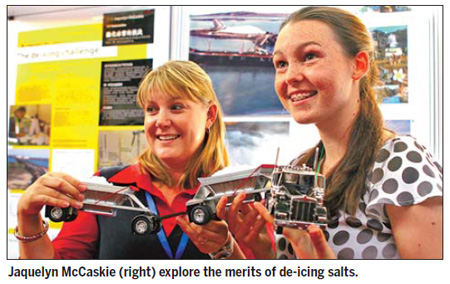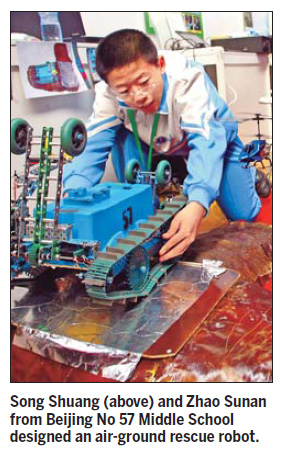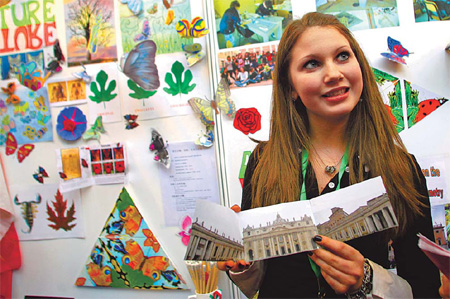Education
Students encouraged to indulge creativity
By Wang Wei (China Daily)
Updated: 2011-03-28 08:03
 |
Large Medium Small |
|
Noa Jungbauer, 13, from the J.J. Winckelmann School in Italy shows her research on symmetrical art. [Photo/China Daily] |

Schools look to cultivate innovation and invention, Wang Wei reports.
In Chinese primary school textbooks, it says China is a nation of invention and innovation. The four great inventions of ancient China - the compass, gunpowder, papermaking and printing - had an enormous impact on the development of Chinese civilization and a far-ranging global impact. However, centuries have now passed with few groundbreaking inventions.
Chinese students are known for passing examinations, but hands-on ability and creativity, it seems, are no longer their forte.
The world-renowned scientist Qian Xuesen who contributed significantly to China 's missile and space program once raised a question which still hasn't been satisfactorily answered: Why can't schools in China cultivate outstanding talent?
On March 25, educators, education authorities and students organized the 31st Beijing Youth Science Creation Competition at Dayu Middle School in Mentougou district to try and remedy the situation. More than 270,000 primary and middle school students brought 1,532 projects to this year's three-day competition, and 167 projects made it to the final.
As a class assistant, Li Jiaxing, 17, has to count hundreds of examination papers and handouts every day, to reduce his labor and save time, he invented a paper counting machine.

Under the guidance of the school's science teacher, Li, a second-grade student from Daxing Middle School Affiliated to Beijing Normal University spent six months creating a machine which can count more than 100 exam papers in three minutes and display the number on a screen.
"I failed at least six times before the final product was finished. But I learnt the key to success is persistence," he said.
Li will continue to prefect his project hoping one day it will make to the market.
A total of 60 students from abroad were also invited to take part in the competition and there were clear differences in their approach to their projects, as they tended to be more practical and they were backed by companies rather than their schools.
Theis Jakobsen from the University of Copenhagen discovered a new way to produce biodiesel from vegetable oil with methanol as the catalyst rather than the conventional bioethanol. He contacted Novozymes - one of the world's leading bio-industrial companies based in Denmark. The company provided laboratory and expertise for Jakobsen and his classmate Sebastian Thomsen to study for two months.
"We discovered that my approach wasn't feasible in the end. But I got a thorough understanding of the procedure which will help me substantially in the future," said Jakobsen.
Schools in Beijing have realized the importance of stimulating children's interest in science at a young age, and started many courses and programs.
The high school affiliated to Renmin University of China has established student societies in astronomy, biology, chemistry and human genes among others and more than 100 science and culture courses since 2000, said Liu Pengzhi, advisor to the State Council and president of the school.
"It is young people's nature to be curious about science and many aspects of life, and the job of educators is to provide a platform for students," she added.
However, many educators still worry that China 's examination-oriented education system is not a conducive environment for stimulating students' creativity and imagination.
The motivation for students to study is currently the highly competitive gaokao (university entrance examination) which is a shortcut to a stable job, said Liu Changming, president of Beijing No 4 Middle School.
"During middle school, students just repeat similar types of excises over and over again to get ready for the gaokao, which is not a process for accumulating knowledge and understanding," he said.
"Once students have enough time to study the area they are interested in their potential will be realized," he added.
| 分享按钮 |
